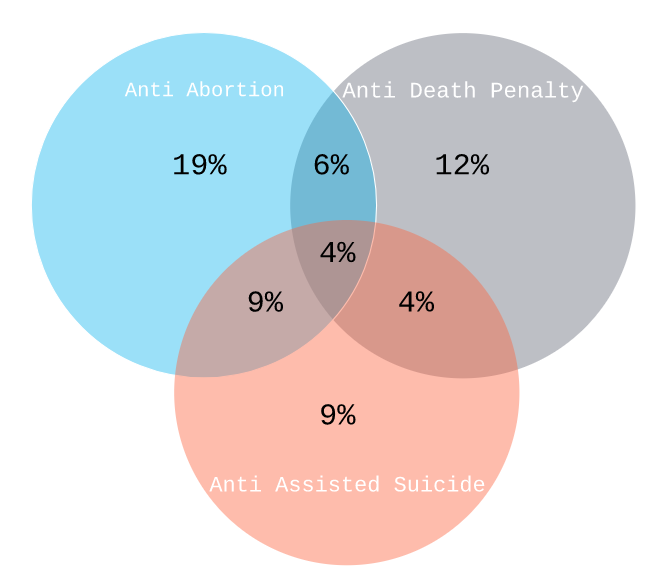Some recent research has brought to mind that an ethical approach that offers the view of the individual as possessing inherent dignity and as inherently social with responsibilities to other individuals and to society was at play during our battle with the Covid epidemic.
People chose to wear masks, practice social distancing, and be vaccinated for self protection and more significantly for the health and safety of others, especially the most vulnerable in society. Attempts to foster this type of ethical behaviour in society include those of Cardinal Joseph Bernardin, who in a lecture at Fordham University, on Dec. 6, 1983, first articulated what he referred to as the "consistent ethic of life."
The following statements attempt to present some non-controversial truths about life processes that concern people who consider making ethical decisions about human life and well being.
- Abortion interupts a process that is very likely to result in birth.
- A sentence of capital punishment initiates a process that is likely to end in an execution.
- Medical Assistance in Death approval initiates a process that is likely to end in an early death.
Dr. Ron Hamel, senior director, ethics, Catholic Health Association, St. Louis writes about problematic personal and social attitudes in medical health that he feels the "consistent ethic of life" may help correct.
Fourth, the consistent ethic of life is corrective in that it brings to light problematic personal and social attitudes — individualism, a utilitarian assessment of persons, privatization of moral choices, excess autonomy, the commodification and commercialization of health care, the technological imperative, and the like — often associated with various technologies and aspects of the health care system. These attitudes are threats to human life and dignity and are, therefore, unacceptable. In their place, as an alternative, the consistent ethic offers a view of the individual as possessing inherent dignity and as inherently social with responsibilities to other individuals and to society.
In sum, Bernardin's consistent ethic of life as a moral vision underscores the fundamental importance of human dignity and human life, sensitizes to threats to human life and well-being, brings these threats to the foreground, inspires alternative attitudes, approaches and practices, and motivates for profound change. (HAMEL, n.d.)
During COVID, the individualism that declared “my body, my choice” around infection precautions and vaccination, fortunately, had less acceptance than the decision by the majority to protect society and reduce hospitalisation and death by adhering to COVID restrictions.
The most vulnerable in our society, thankfully, continue to remind us that an utilitarian assessment of persons, based perhaps on their usefulness to the maintenance and increase of our GNP, is a direction we have rejected in our condemnation of autocratic regimes and atrocities against human life.
We have wrestled with the impact of our moral choices more intensely in COVID times as we have moved to understanding the limits of our freedom and autonomy come into play when we negatively impact the life and health of others.
An epidemic may also bring into view the economic costs of sustaining human life. The requirement that we try to base treatment on medical need rather than the ability of the patient to contribute to the cost of treatment mandated that money be injected by the government into the care of COVID patients.
Prior to our societal and personal experience of COVID, Ryan P. Burge researched attitudes in the United States about social movements supporting anti-abortion, anti-death penalty, and anti-assisted suicide policies.
Public opinion has shifted over time. Opposition to the death penalty was relatively consistent over the last 30 years; since the early 2000s, it has reached almost 40 percent. The other two issues saw a significant shift between 1977 and 2000. Though opposition in both cases has been increasing again in the new millennium, overall the American public has become more supportive of allowing a woman to receive an abortion for any reason as well as allowing terminally ill individuals to end their lives (both by 20 to 25 points more). (Burge, 2017)
The overturning of Row v Wade by the Supreme Court of the United States has made “we” versus “them” conflicts more prominent as the “culture wars” challenge our attempts to discern courses of action that provide health care and social supports for women discerning a potential birth in their future.
Justice Systems deal in the three R’S, Retribution, Restitution, and Rehabilitation. The process initiated by a sentence of Capital Punishment needs to respond with ethical treatment respecting the dignity of the person and the benefits to society of recognizing rehabilitation.
Perhaps the utilitarian view of care for people approaching death has allowed loneliness, neglect, or lack of financial or comfort resources to outweigh the social and psychological benefits to the dying person and the people who care for them by fully experiencing the mystery of death.
Reducing the human experiences of birth, reconciliation, and death to individual decisions with utilitarian outcomes, in accord with “my truth”, denies the deeply social meaning of the connection of our lives to the lives of others and the opportunity of community to enrich our life. The “consistent ethic of life” emphasises our responsibilities to other individuals and to society. This emphasis has been essential in our progress against COVID in recent years and may introduce some common ground for support for people in search of a better life.
References
Burge, R. P. (2017, September 12). Almost No One in the US Believes in a 'Consistent Ethic of Life'. Christianity Today. Retrieved June 27, 2022, from https://www.christianitytoday.com/ct/2017/september-web-only/consistent-ethic-life-abortion-euthanasia-death-penalty-gss.html
HAMEL, R. (n.d.). Twenty-Five Years Later: Cardinal Bernardin's Consistent Ethic of Life. Catholic Health Association. Retrieved June 27, 2022, from https://www.chausa.org/publications/health-progress/article/november-december-2008/twenty-five-years-later-cardinal-bernardin%27s-consistent-ethic-of-life


No comments:
Post a Comment